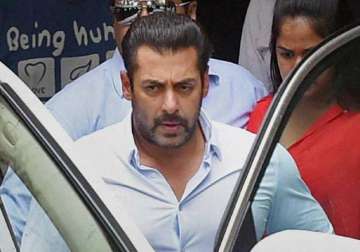No categorical evidence to prove Salman was in an inebriated state: Bombay HC
Mumbai: Bombay High Court is dictating order on superstar Salman Khan's appeal against his conviction in the 2002 hit-and-run case, in which he was found guilty of running over pavement dwellers with his SUV after

Mumbai: Bombay High Court is dictating order on superstar Salman Khan's appeal against his conviction in the 2002 hit-and-run case, in which he was found guilty of running over pavement dwellers with his SUV after a night out drinking.
The Court started its dictation on Monday and has observed that the FIR was silent on the issue of "drunkenness" of the actor, which cannot be considered as "minor."
The Court also observed that though witness confirmed that Salman fled from the accident site and felt twice in the process but whether he was in an inebraited state was not proved.
Court also observed that there is no direct witness who has confirmed Salman consumed liquor in Rain Bar and also seen him on driver's seat while he left the parking of J. W. Mariott hotel.
Waiter Malaya Wagh who was in the bar testified that he served bacardi Rum cocktail and snacks to Khan and his friends. He also saw hime consuming alcohol.
Defense dismissed the claim that Salaman consumed Bacardi saying that he only drank water. The defense also addded that it is not necessary that one visits bar will drink alcohol.
In May this year, the actor was convicted for all charges against him by a sessions' court in Mumbai. He then appealed against the conviction in the Bombay High Court which suspended his sentence.
The 49-year-old actor then appealed against the conviction in the Bombay High Court which suspended his sentence.
Last month, Salman Khan's plea to make singer Kamaal Khan a witness in the case was dismissed by the Bombay High Court. Kamaal Khan was in the car with Salman Khan in 2002 on the night of the accident.
The Bombay High Court On Monday said it would give its ruling on the applicability of culpable homicide charge against Bollywood star Salman Khan in the 2002 hit-and-run case and also on other key questions like the admissibility of the statement of the actor's former body guard as evidence.
This was stated by Justice A R Joshi while giving dictation of the verdict in the open court in the appeal filed in the High Court by Khan against the May 6 judgement of a Mumbai Sessions court which sentenced him to five years jail term.
Justice Joshi said he would give a ruling on whether the statement of Ravindra Patil, an eye witness and former police bodyguard of Salman, was admissible as evidence under section 33 of Indian Evidence Act.
Salman contended that the charge of culpable homicide was not justified and wrongly invoked in the case. He also challenged the prosecution's step of relying upon Patil's statement in the trial court, saying this witness died and hence was not available for cross-examination.
The prosecution opposed Salman's plea and justified invocation of culpable homicide charge against the actor saying he had driven the car in a rash and negligent manner under the influence of liquor on September 28, 2002, when he met with a mishap.
During the course of the judgement, the Judge said the High Court would also scrutinise other important issues including whether the deceased had been killed due to the impact of the car mishap or whether the car dropped off the hook of a crane, called to remove it, and fell accidentally on the victim.
The HC would also give a ruling on the "drunken" state of Salman Khan on the ill-fated day.
While the prosecution has argued that the actor had taken alcoholic drinks at Rain Bar and Restaurant at Vile Parle before meeting with the mishap in suburban Bandra, Salman has denied the charge saying evidence does not suggests this.
The Judge said that in the verdict he will also dwell on the issues such as why Kamaal Khan, singer-friend of Salman, who was with the actor in his car on the ill-fated day, was not examined.
The HC had recently rejected Salman's plea on issuing a directive to examine Kamaal Khan as witness.